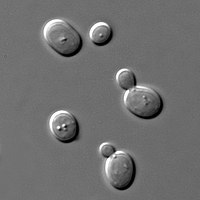
Photo from wikipedia
Hulls are considered residues from rice production, and due to its low commercial value, there is little interest in developing biotechnological approaches for its reuse. However, the biological pre-treatment can… Click to show full abstract
Hulls are considered residues from rice production, and due to its low commercial value, there is little interest in developing biotechnological approaches for its reuse. However, the biological pre-treatment can be a safe and environmentally friendly alternative for developing new uses for this waste material. Therefore, this work aimed to select efficient fungal isolates to be used in the pre-treatment of rice hulls to enhance methane production in anaerobic digestion processes. Two fungal isolates (Pleu1 and Shi2) were able to grow in media containing rice hull as the sole carbon source. Further, ideal conditions for rice hull colonization were evaluated, and 28 °C and 60% humidity were used to inoculate this material. Rice hulls inoculated with Shi2 for 30 days presented approximately 27% and 10% reduction in lignin and cellulose/hemicellulose contents, respectively. Crushed rice hulls inoculated with Shi2 presented an increase of approximately 4.5-fold in biochemical methane potential when compared to non-inoculated material. This work reports the first step for new applicability of rice hulls. However, other studies are needed to show the economic viability and efficiency of this biological process aiming a large-scale application.
Journal Title: Journal of Material Cycles and Waste Management
Year Published: 2021
Link to full text (if available)
Share on Social Media: Sign Up to like & get
recommendations!